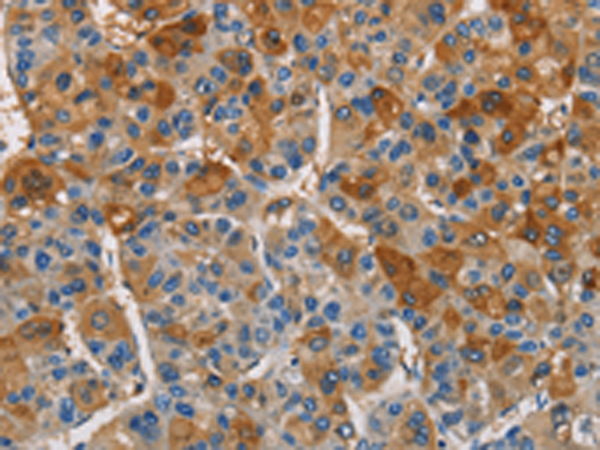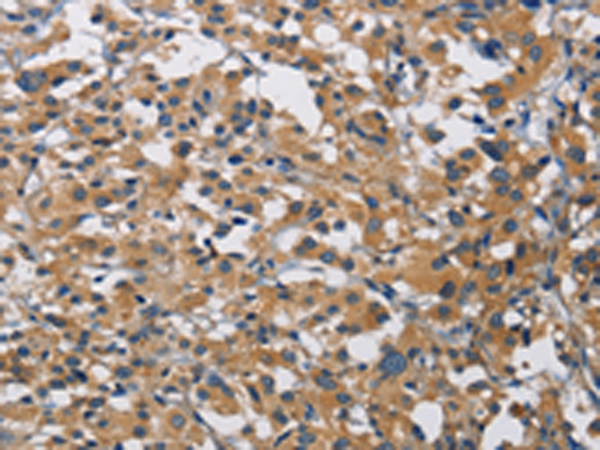

| WB | 咨询技术 | Human,Mouse,Rat |
| IF | 咨询技术 | Human,Mouse,Rat |
| IHC | 1/50-1/200 | Human,Mouse,Rat |
| ICC | 技术咨询 | Human,Mouse,Rat |
| FCM | 咨询技术 | Human,Mouse,Rat |
| Elisa | 1/1000-1/5000 | Human,Mouse,Rat |
| Host/Isotype | Rabbit IgG |
| Antibody Type | Primary antibody |
| Storage | Store at 4°C short term. Aliquot and store at -20°C long term. Avoid freeze/thaw cycles. |
| Species Reactivity | Human |
| Immunogen | Fusion protein of human CST4 |
| Formulation | Purified antibody in PBS with 0.05% sodium azide and 50% glycerol. |
+ +
以下是关于CST4抗体的示例参考文献(内容为模拟概括,仅供参考):
1. **《Cystatin S (CST4) as a Biomarker in Gastric Cancer》**
- 作者:Zhang Y, et al.
- 摘要:研究CST4在胃癌组织中的高表达及其抗体在血清检测中的应用,表明其作为胃癌诊断和预后生物标志物的潜力。
2. **《CST4 Antibody-Based Detection in Colorectal Cancer Tissues》**
- 作者:Wang L, et al.
- 摘要:通过免疫组化分析CST4抗体在结直肠癌中的表达,发现其与肿瘤侵袭性和患者生存率显著相关。
3. **《Role of CST4 in Tumor Metastasis and Antibody Targeting Strategies》**
- 作者:Chen X, et al.
- 摘要:探讨CST4促进肿瘤转移的分子机制,并开发靶向CST4的单克隆抗体,在体外实验中显示抑制癌细胞迁移的效果。
4. **《CST4 Autoantibodies in Early-Stage Pancreatic Cancer Diagnosis》**
- 作者:Kim S, et al.
- 摘要:评估CST4自身抗体在胰腺癌患者血清中的水平,提出其作为早期筛查工具的临床价值。
注:以上为模拟示例,实际文献需通过PubMed或Web of Science等平台检索确认。
The CST4 antibody targets cystatin-SN (CST4), a member of the cystatin superfamily of cysteine protease inhibitors. Cystatins regulate proteolytic activity by inhibiting cathepsins, enzymes involved in protein degradation, immune responses, and tissue remodeling. CST4. primarily secreted by salivary and lacrimal glands, is found in bodily fluids like saliva and tears. It plays roles in maintaining oral homeostasis, modulating inflammation, and protecting mucosal surfaces from enzymatic damage.
CST4 has gained attention in biomedical research due to its potential as a biomarker. Elevated CST4 levels are associated with oral squamous cell carcinoma, Sjögren's syndrome, and other inflammatory or neoplastic conditions, suggesting diagnostic or prognostic utility. In cancer, CST4 may influence tumor progression by regulating extracellular matrix remodeling and immune evasion.
The CST4 antibody is widely used in techniques like immunohistochemistry, ELISA, and Western blot to detect protein expression patterns in tissues or biofluids. Researchers employ it to investigate CST4's functional roles, tissue distribution, and clinical relevance. Recent studies also explore its involvement in autoimmune diseases and chronic inflammatory disorders, highlighting its multifaceted biological significance. Validated for specificity and sensitivity, this antibody remains a critical tool for unraveling CST4's pathophysiology and therapeutic potential.
×